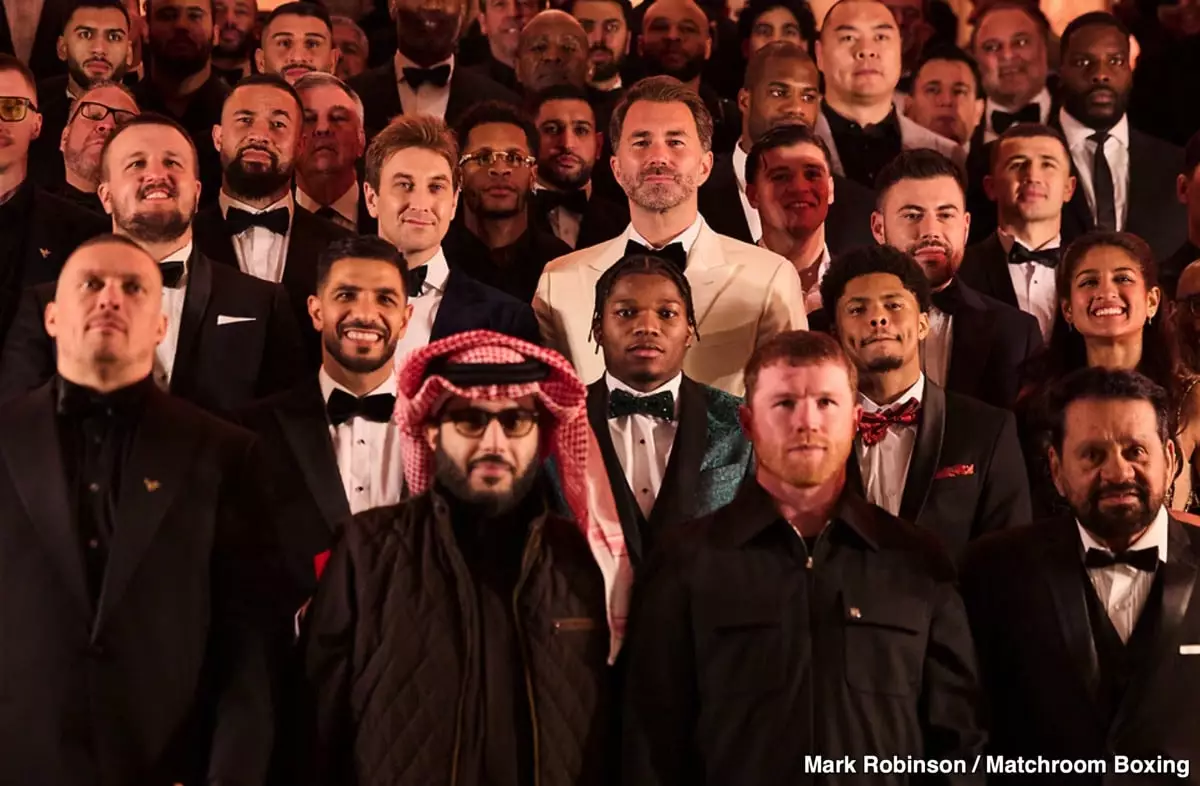In an era where fighters are not only athletes but also brand ambassadors, Gervonta “Tank” Davis has stirred the pot with his alarming remarks about a recent photo featuring top fighters alongside Turki Alalshikh. His provocative claim that the image radiates “Devil s**t” and evokes notions of “selling their souls” speaks volumes about contemporary boxing culture. The grim aesthetic of the photo, combined with Davis’s unsettling assessment, has illuminated a broader issue affecting the sport today.
The visual components of the image contribute significantly to its unsettling perception. With fighters donning formal attire yet surrounded by an ambiguous and shadowy backdrop, the scene invites speculation. Fans on social platforms have likened the fighters’ poses to those of cult-like followers, echoing sentiments of being brainwashed disciples caught in a macabre ritual. The combination of bow ties and the eerie ambiance creates a surreal tableau that undermines the integrity of these athletes—who should be seen as proud competitors instead of lost souls. The striking analogy drawn to the infamous Heavens Gate cult characterizes not only an aesthetic but hints at possible ethical dilemmas engulfing the boxing world.
Davis’s concerns extend far beyond mere imagery; they delve into the intricate and often treacherous landscape of boxing in the Middle East, particularly Riyadh, where lucrative fight contracts are often coupled with controversial decisions. While Davis did not specify which bouts raised red flags, boxing fans readily recall questionable calls in matches like Carlos Adames vs. Hamzah Sheeraz and Artur Beterbiev vs. Dmitry Bivol. These incidents have raised significant eyebrows and have potentially altered the trajectory of fighters’ careers, serving as reminders of the sport’s occasional descent into chaos.
Davis’s apprehension is clear: “I already know what y’all going to do,” he stated, alluding to the potential for manipulation within the sport’s governing frameworks. This perception of a tainted environment fosters distrust, compelling fighters to question whether they are risking their careers for an authentic competition or simply playing a role in a scripted drama. His reflections highlight the tension between the commercial pressures that dictate modern boxing and the integrity that the sport was built upon.
In this digital age, the influence of social media cannot be overstated. Davis’s vocalization of doubt resonates within the online community, where fans rapidly mobilize to share their views. The collective opinion emerging from platforms like X reveals an alarming trend: fighters who once sought to embody principles of honor and respect are now viewed as pawns in a larger narrative orchestrated by promoters and special interest groups. The chasm between athletic prowess and public perception grows wider as image and reputation increasingly overshadow talent alone.
Ultimately, Gervonta Davis’s candid criticism serves as both a wake-up call and a poignant reminder that the allure of fame and wealth must not come at the expense of authenticity. As boxing navigates these murky waters, it is essential for athletes to reclaim their narratives, rise above the shadows of controversy, and emerge as champions not just inside the ring but in the court of public opinion. In a sport as storied as boxing, one can only hope that integrity will prevail over theatrics.


Leave a Reply